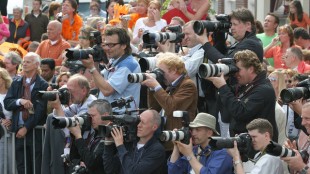
-
 Global stocks mostly rise in thin pre-Christmas trade
Global stocks mostly rise in thin pre-Christmas trade
-
Postecoglou says Spurs 'need to reinforce' in transfer window

-
 Le Pen says days of new French govt numbered
Le Pen says days of new French govt numbered
-
Global stocks mostly rise after US tech rally

-
 Villa boss Emery set for 'very difficult' clash with Newcastle
Villa boss Emery set for 'very difficult' clash with Newcastle
-
Investors swoop in to save German flying taxi startup

-
 How Finnish youth learn to spot disinformation
How Finnish youth learn to spot disinformation
-
South Korean opposition postpones decision to impeach acting president

-
 12 killed in blast at Turkey explosives plant
12 killed in blast at Turkey explosives plant
-
Panama leaders past and present reject Trump's threat of Canal takeover

-
 Hong Kong police issue fresh bounties for activists overseas
Hong Kong police issue fresh bounties for activists overseas
-
Saving the mysterious African manatee at Cameroon hotspot

-
 India consider second spinner for Boxing Day Test
India consider second spinner for Boxing Day Test
-
London wall illuminates Covid's enduring pain at Christmas

-
 Poyet appointed manager at South Korea's Jeonbuk
Poyet appointed manager at South Korea's Jeonbuk
-
South Korea's opposition vows to impeach acting president

-
 The tsunami detection buoys safeguarding lives in Thailand
The tsunami detection buoys safeguarding lives in Thailand
-
Teen Konstas to open for Australia in Boxing Day India Test

-
 Asian stocks mostly up after US tech rally
Asian stocks mostly up after US tech rally
-
US panel could not reach consensus on US-Japan steel deal: Nippon

-
 The real-life violence that inspired South Korea's 'Squid Game'
The real-life violence that inspired South Korea's 'Squid Game'
-
Blogs to Bluesky: social media shifts responses after 2004 tsunami

-
 Tennis power couple de Minaur and Boulter get engaged
Tennis power couple de Minaur and Boulter get engaged
-
Supermaxi yachts eye record in gruelling Sydney-Hobart race

-
 Hawaii's Kilauea volcano erupts, spewing columns of lava
Hawaii's Kilauea volcano erupts, spewing columns of lava
-
Sokoman Minerals Completes Phase 1 Diamond Drilling Program Fleur de Lys Gold Project, NW Newfoundland

-
 Canadian Government Provides C$100 Million Financing LOI to Green Technology Metals in Support of Electric Royalties' Flagship Lithium Royalty Asset in Ontario
Canadian Government Provides C$100 Million Financing LOI to Green Technology Metals in Support of Electric Royalties' Flagship Lithium Royalty Asset in Ontario
-
Sendero Resources Announces First Tranche Closing of Its Non-Brokered Private Placement

-
 EVSX Completes Installation of Multi Chemistry Line
EVSX Completes Installation of Multi Chemistry Line
-
InterContinental Hotels Group PLC Announces Transaction in Own Shares - December 24

-
 El Salvador Congress votes to end ban on metal mining
El Salvador Congress votes to end ban on metal mining
-
Five things to know about Panama Canal, in Trump's sights

-
 NBA fines Minnesota guard Edwards $75,000 for outburst
NBA fines Minnesota guard Edwards $75,000 for outburst
-
Haitians massacred for practicing voodoo were abducted, hacked to death: UN

-
 Inter beat Como to keep in touch with leaders Atalanta
Inter beat Como to keep in touch with leaders Atalanta
-
Mixed day for global stocks as market hopes for 'Santa Claus rally'

-
 Man Utd boss Amorim questions 'choices' of Rashford's entourage
Man Utd boss Amorim questions 'choices' of Rashford's entourage
-
Trump's TikTok love raises stakes in battle over app's fate

-
 Is he serious? Trump stirs unease with Panama, Greenland ploys
Is he serious? Trump stirs unease with Panama, Greenland ploys
-
England captain Stokes to miss three months with torn hamstring

-
 Support grows for Blake Lively over smear campaign claim
Support grows for Blake Lively over smear campaign claim
-
Canada records 50,000 opioid overdose deaths since 2016

-
 Jordanian, Qatari envoys hold talks with Syria's new leader
Jordanian, Qatari envoys hold talks with Syria's new leader
-
France's second woman premier makes surprise frontline return

-
 France's Macron announces fourth government of the year
France's Macron announces fourth government of the year
-
Netanyahu tells Israel parliament 'some progress' on Gaza hostage deal

-
 Guatemalan authorities recover minors taken by sect members
Guatemalan authorities recover minors taken by sect members
-
Germany's far-right AfD holds march after Christmas market attack

-
 European, US markets wobble awaiting Santa rally
European, US markets wobble awaiting Santa rally
-
Serie A basement club Monza fire coach Nesta


Nobel Peace Prize winner Nihon Hidankyo calls for a world without nukes
Japan's atomic bomb survivors' group Nihon Hidankyo accepted its Nobel Peace Prize on Tuesday, pleading for the abolition of nuclear weapons that are resurging as a threat 80 years after the Hiroshima and Nagasaki bombings.
One of the three Nihon Hidankyo co-chairs, 92-year-old Nagasaki survivor Terumi Tanaka, demanded "action from governments to achieve" a nuclear-free world.
The prize was presented at a time when countries like Russia -- which has the world's largest nuclear arsenal -- increasingly brandish the atomic threat.
"I am infinitely saddened and angered that the 'nuclear taboo' threatens to be broken," Tanaka told dignitaries at Oslo's City Hall, some clad in traditional Norwegian bunads or Japanese kimonos.
Russian President Vladimir Putin has repeatedly made nuclear threats as he presses the war in Ukraine. He signed a decree in November lowering the threshold for using atomic weapons.
In a strike on the Ukrainian city of Dnipro a few days later, the Russian army fired a new hypersonic missile capable of carrying a nuclear warhead, although in this instance it had a regular payload.
Nihon Hidankyo works to rid the planet of the weapons of mass destruction, relying on testimonies from survivors of Hiroshima and Nagasaki, known as "hibakusha".
The US bombings of the Japanese cities on August 6 and 9, 1945 killed 214,000 people, leading to Japan's surrender in World War II.
- Burnt bodies -
Tanaka was 13 years old when Nagasaki was bombed, the epicentre just three kilometres (1.8 miles) west of his home. Five members of his family were killed.
He was upstairs reading a book when the A-bomb was dropped.
"I heard the explosion and all of a sudden saw a bright white light, which surrounded everything and everything became silent," he recalled.
"I was really surprised. I felt my life in danger."
Rushing to the ground floor, he lost consciousness when two glass doors, blown out by the detonation, fell on him, though the glass did not break.
Three days later, he and his mother went searching for their relatives. That was when they realised the scope of the disaster.
"When we reached a ridge over the hills, we could look down over the city and that was when, for the first time, we saw that there was absolutely nothing left. Everything was black and charred."
He saw gravely wounded people fleeing the city, burnt bodies on the roadside. He and his mother cremated his aunt's body "with our own hands".
"I was numb, not able to feel anything."
Nihon Hidankyo's ranks are dwindling with every passing year. The Japanese government lists around 106,800 "hibakusha" still alive today. Their average age is 85.
- 'Uphold nuclear taboo' -
For the West, the nuclear threat also comes from North Korea, which has increased its ballistic missile tests, and Iran, which is suspected of seeking to develop nuclear weapons though it denies this.
Nine countries now have nuclear weapons: Britain, China, France, India, North Korea, Pakistan, Russia, the United States, and, unofficially, Israel.
"Our movement has undoubtedly played a major role in creating the 'nuclear taboo'," Tanaka said.
"However, there still remain 12,000 nuclear warheads on Earth today, 4,000 of which are operationally deployed, ready for immediate launch."
In 2017, 122 governments negotiated and adopted a UN Treaty on the Prohibition of Nuclear Weapons (TPNW), but the text is considered largely symbolic as no nuclear power has signed it.
While all ambassadors stationed in Oslo were invited to Tuesday's ceremony, the only nuclear powers in attendance were Britain, France, India, Pakistan and the United States. Russia, China, Israel and Iran were not present, the Nobel Institute said.
Expressing concern about the world entering "a new, more unstable nuclear age", Norwegian Nobel Committee chairman Jorgen Watne Frydnes warned that "a nuclear war could destroy our civilisation".
"Today's nuclear weapons ... have far greater destructive power than the two bombs used against Japan in 1945. They could kill millions of us in an instant, injure even more, and disrupt the climate catastrophically," he warned.
Later, the Nobel laureates for medicine, physics, chemistry, literature and economics received their prizes from Sweden's King Carl XVI Gustaf at a separate ceremony in Stockholm, followed by a banquet for some 1,250 guests.
F.Pedersen--AMWN